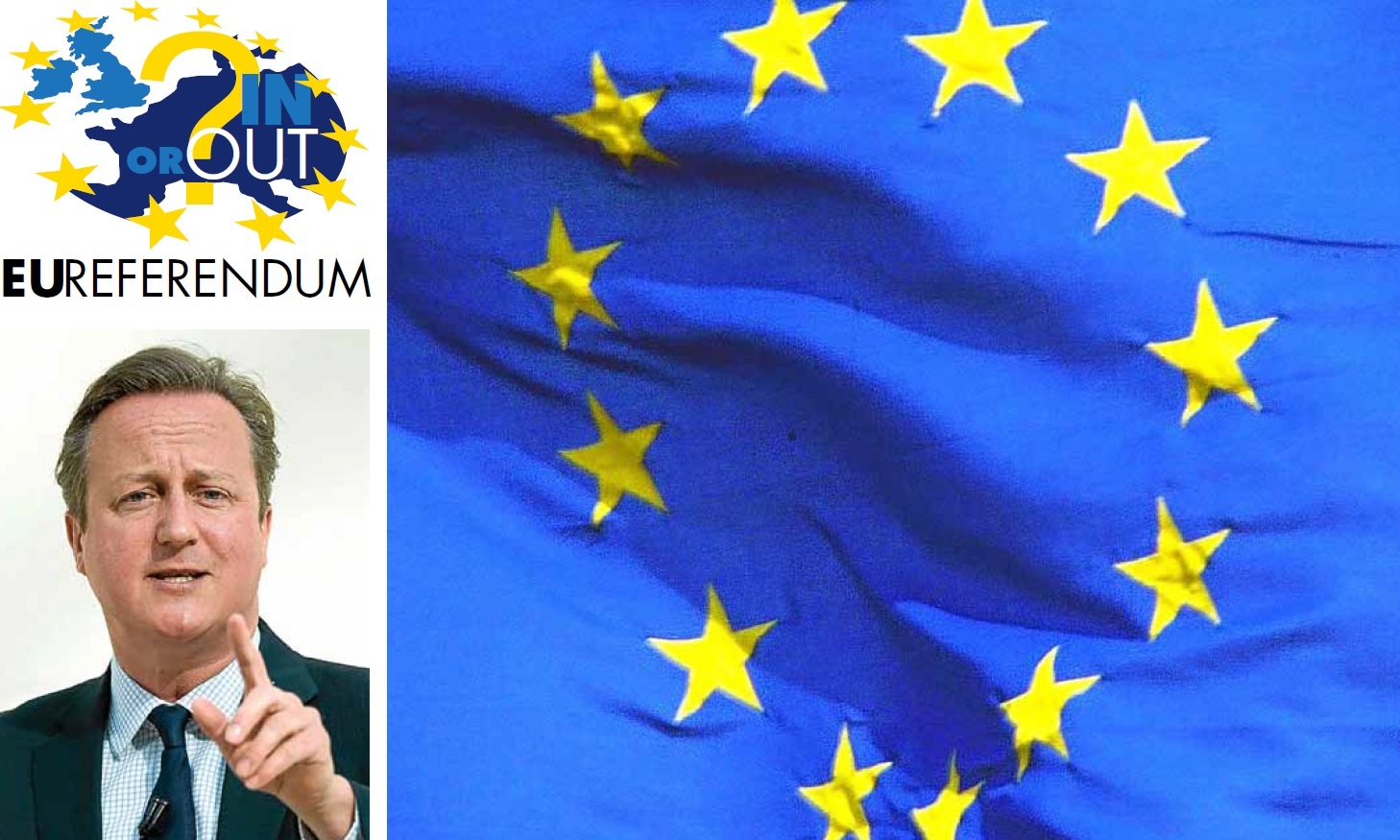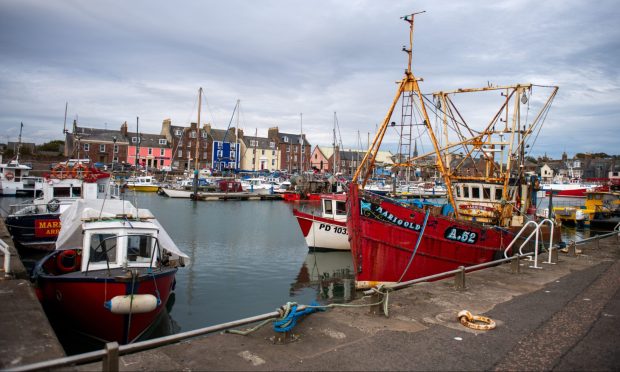Debate has raged around the EU Referendum on June 23 with much of the input casting more heat than light on the issues involved. The Courier gave readers the exclusive opportunity to ask questions directly of Prime Minister David Cameron. Mr Cameron is a leader of the official “Remain” campaign, Britain Stronger in Europe. We selected five questions from those submitted and Mr Cameron provided his answers.
HOUSE PRICES
Hugh Dunlop of Carnoustie says:
Mr Cameron has warned us that house prices will fall, and interest rates will rise if we quit the EU. Young couples are often able to pay mortgages, but struggle to get deposits large enough. If house prices fall, this will be easier.
Older people wishing to downsize cannot sell their houses as youngsters cannot afford the deposits, They will be able to sell their houses and move to smaller houses which will also be cheaper.
Any possible increase in bank rates will be taken care of for the younger house buyers with their mortgages being smaller, and the older couples will get a better return on their savings.
Additional house sales and purchases will be good news for estate agents and lawyers, and a stimulus to the economy.
Will a Brexit in view of this really be such a disaster?
Mr Cameron responds:
You suggest that an increase in bank rates would be no problem – but I invite you to cast your mind back to the days when interest rates went up into double figures and remember the impact that had on many people’s lives, with people unable to pay their mortgages and family homes repossessed. I certainly don’t want to see a repeat of that.
We do need more affordable housing and it’s important we prevent house price inflation getting out of control – that’s why the UK Government has taken measures on both those fronts.
But for people who have struggled to save and buy their own home, including people helped by the UK Government’s Help to Buy scheme, I don’t think a house price shock will be welcome at all. It would put the results of their hard work at risk and create the danger of people being pushed into negative equity, something which can have disastrous consequences.
It’s important to remember, too, that any fall in house prices and increase in interest rates wouldn’t stand by themselves – they would be just two consequences of the wider shock to the economy of leaving the EU.
Treasury analysis shows that our country would be permanently poorer if we left, leaving a £36 billion black hole in our public finances, equivalent to an interest rate rise of 8p in the pound.
And more than three million jobs in the UK are linked to exports to the EU – including 250,000 in Scotland. So it is hard-working families who would be hit, and I don’t want to see their jobs and businesses put at risk.
CAMPAIGN TONE
David Armstrong of Dundee:
During the Scottish independence referendum, I was won over by the positivity of the Yes campaign.
I am disappointed to see the same negative tactics that were used against us during that campaign once again being deployed, even if this time by the Remain side which I happen to support, and this troubles me greatly.
Can you therefore please give three positive, progressive reasons why EU membership is important to Scotland and to the wider UK without reference to the fear tactics or negative hyperbole which has dominated Remain so far.
Mr Cameron responds:
I think there is a very strong positive case to be made for why Scotland and the whole UK will be stronger, safer and better off as part of a reformed EU.
Being in the EU gives British businesses full access to a home market of 500 million people – meaning not only that we can trade across Europe free of tariffs or barriers, but we can use our strength in numbers to open up deals with other major economies like the US, Japan and China.
EU membership gives us global influence – a place at all the top tables when key decisions that affect our future are made. It allows us to exchange vital information on terrorism and crime with our EU partners, and to benefit from the European Arrest Warrant, enabling us to extradite wanted criminals from other member states.
And a vote for remain will also mean British people continue to have the right to travel, work, study and retire anywhere in Europe – but at the same time, because of our new deal with the EU, we’ve been able to end the something for nothing culture and reduce the unnatural draw that our welfare system had on migration.
REFORMING EU INSTITUTIONS
Alexander Geddie of Glenrothes says:
You regularly suggest that the UK should remain part of a ‘reformed’
EU. Thus far, I and many other acquaintances have seen no evidence whatsoever of movement within the EU towards reformation.
Have you been given any assurances from the Commission, Council of Ministers, or even the EU Parliament that reformation has started or is about to start on the many areas of interest to the UK population, as described frequently in our national press?
Mr Cameron responds:
I talk about staying in a reformed EU because the deal I negotiated before
calling this referendum has shifted the dial in the EU in our favour and given us the best of both worlds.
We get to keep full access to the single market of 500 million people for our exporters, while retaining a say over the rules of doing business across Europe.
For families and workers in Scotland and across the UK, that means more jobs, lower prices and financial security.
But in the reformed EU, we are permanently out of “ever closer union”, we will never be part of a European superstate and we have tackled head on the
something-for-nothing culture that, in the past, has seen too many migrants head to the UK simply to take advantage of our welfare system.
Crucially, we have also achieved agreement within Europe that a lot of red tape, particularly affecting small businesses, will be tackled, and there will be stronger roles for national parliaments. I have also secured commitments for the EU to work harder on securing new trade deals and completing the single market, which is in our interest.
The deal I have negotiated is legally binding and irreversible, as the President of the European Council Donald Tusk said himself in February. We have also passed a Referendum Act to make sure that no powers can be handed to Brussels without the explicit consent of the British people in a referendum. Our deal keeps us out of the euro, meaning we continue to control our own currency in the best interests of the UK, and ensures the pound cannot be discriminated against or disadvantaged by the EU.
But I’m the first to agree that our task of reforming the European Union should not end with the referendum, and we must continue to pursue ways in which the EU needs to improve further. The EU will always be our biggest market, and if we want to see it continue the process of reform we have to be inside making the case, not outside accepting the consequences.
ECONOMY
Steve Gwynne says:
The main problem with the EU economic policy of creating a highly competitive social market economy (TEU Article 3) for the UK is the infrastructural lag that is created due to excessive migration and the catch 22 that you need more migration to service the needs of economic migration.
This might look good for GDP but in reality spells disaster for reducing budget deficits and national debt, especially if much of EU economic migration is minimum waged labour (which it is).
How do you propose to resolve the underlying economic crisis that is being created by EU economic policy despite the so-called benefits of increasing GDP and the associated expansion of the UK economy.
Mr Cameron responds:
I’m in complete agreement with those who say that levels of immigration we’ve had in this country in the past have been too high. In 2004, the then UK
Government had the opportunity to restrict immigration from new accession countries but chose not to do so. That was a big mistake in my view.
But that’s not to say that migration, when managed sensibly, isn’t a positive thing for this country. Take agriculture, for instance – our farmers need access to
seasonal labour, which the EU gives us. And then of course there is our NHS, which would really struggle without its staff from overseas.
I think it’s important we recognise that many of the migrants who come to the UK are hard-working people who play by the rules and contribute a great deal to our economy and society. But at the same time we need to end the artificial draw of the something-for-nothing culture.
That’s what I’ve achieved with the new emergency welfare break which means people need to have lived here for four years before they get full access to our
welfare system.
As far as infrastructure is concerned, it’s worth bearing in mind that leaving the EU would see us lose access to infrastructure finance from the European Investment Bank, an organisation which has pumped more than £16 billion into UK projects over the past three years.
MIGRATION
James Carpenter says:
There is a primary school in Scotland that doesn’t have a single Scottish child. It is estimated there will be nearly a million foreign children in our schools who don’t speak English in our schools in the next few years.
How are you going to ensure that UK children will get the education they deserve and not be held back by non-English speaking children who will need more help and money spent on them?
Mr Cameron responds:
I think the UK is the world’s most successful multi-racial, multi-ethnic democracy, and that is something I am very proud of. But, as your question demonstrates, if you have uncontrolled migration then it can result in real problems – including in terms of integration and pressure on infrastructure and public services.
I’m afraid that the two men who preceded me as prime minister didn’t always recognise that.
I have always believed controlled immigration, better integration and a stronger society go together. With our special status, staying in a reformed EU gives us the best of both worlds.
We can deal with this issue of migrants being drawn here because of our welfare system, but we can also keep the important economic and security benefits of EU membership.
In the meantime, of course, it is vitally important that schools get all the support they need to handle difficult situations like the one you describe. That’s certainly
happening in England, where the UK Government oversees education, and I hope the Scottish Government is equally committed.




